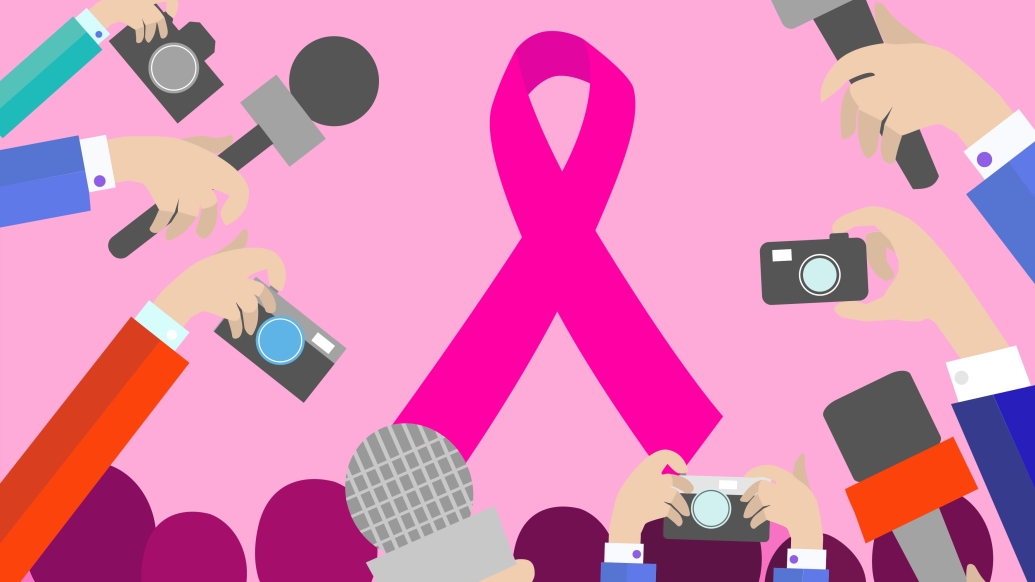A new U-M study examines how media coverage of celebrity health has influenced breast cancer treatment decisions.
8:00 AM
Author |

When actress Christina Applegate was diagnosed with breast cancer, a family history and BRCA gene mutation influenced her decision to have a double mastectomy. The BRCA mutation meant she had a high risk of cancer returning in one breast or a new cancer developing in the other breast. It's a detail that only a small proportion of media coverage included.
So, though many refer to the rise in double mastectomies as the "Angelina Jolie effect," a new study suggests it might be more aptly deemed the "Christina Applegate effect."
From 2000 to 2012, the number of women with breast cancer who underwent double mastectomy at the University of Michigan rose nearly fivefold. In that time, 17 celebrities publicly disclosed their breast cancer diagnosis and treatment. Michael Sabel, M.D., and Sonya Dal Cin, Ph.D., analyzed 727 articles from major U.S. print publications that covered these celebrity diagnoses. They published their results in Annals of Surgical Oncology.
Four celebrities in the study period underwent double mastectomy, and 45 percent of the media coverage about their diagnosis mentioned that. Of the 10 celebrities who had a single mastectomy or breast conserving therapy, 26 percent of the media coverage discussed it.
"Much more often, patients are not coming in asking what their options are for treatment. They are coming in saying they want a bilateral mastectomy," says Sabel, who is chief of surgical oncology and a breast cancer surgeon at the University of Michigan Comprehensive Cancer Center. "Patients are increasingly using outside sources of information, such as the Internet, and coming to their own conclusion."
People underestimate the impact of celebrity news reports on medical knowledge. It's naïve to think this is not a source from where we get our medical information.Michael Sabel, M.D.
The rise of celeb-fueled health trends
And then there's Angelina Jolie. In 2013, Jolie wrote in The New York Times that she had both breasts removed because a BRCA mutation put her at high risk of breast cancer.
"In Angelina Jolie's case, almost every single article explains why she had a bilateral mastectomy. Contrast that to Christina Applegate, who also had a BRCA mutation. That was rarely discussed in media articles," Sabel says.
"People underestimate the impact of celebrity news reports on medical knowledge," he adds. "It's naïve to think this is not a source from where we get our medical information."
It's not uncommon for celebrities to influence medical decisions. Following Jolie's announcement, more people sought genetic testing. After Katie Couric underwent a colonoscopy on the Today Show, colonoscopy rates increased. In 1987, after Nancy Reagan chose a mastectomy over breast conserving therapy, rates of breast conservation dropped 20 percent.
The concern, the authors write, is that women today are choosing double mastectomy based on inaccurate information about the risks and benefits. And because they are coming to their surgeon with their mind made up, there's less opportunity for surgeons to educate.
"When the next celebrity has a double mastectomy, we as physicians need to make sure we are putting the right messages out. This includes framing the story in terms of why the patient had a bilateral mastectomy and when that might be a good decision for a patient," Sabel says.
"We have to make reporters aware that there is an inherent bias in how they are presenting this. Their stories could have an impact on what patients are choosing to do."

Explore a variety of healthcare news & stories by visiting the Health Lab home page for more articles.

Department of Communication at Michigan Medicine
Want top health & research news weekly? Sign up for Health Lab’s newsletters today!





